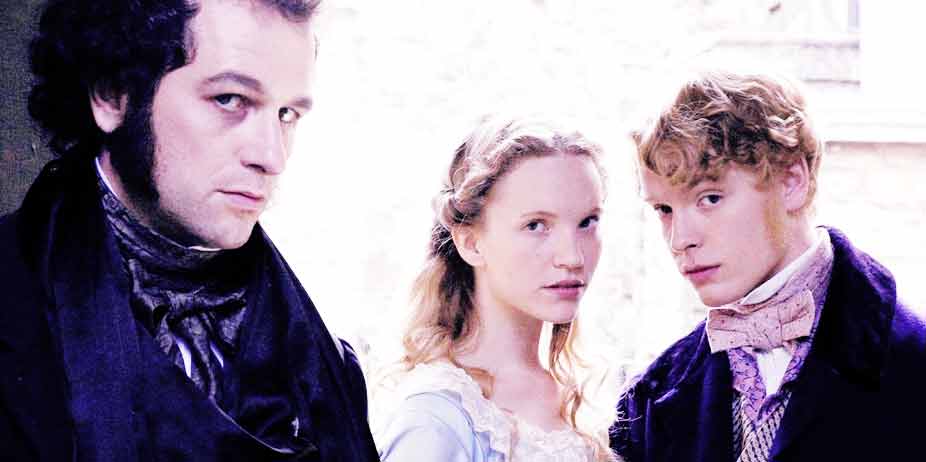
The Mystery of Edwin Drood (2012)
It was the novel Charles Dickens
never finished. Halfway into the
narrative, he suffered from a stroke and
died the following day, leaving his
mystery unfinished. No one knows how he
intended it to end, but after a viewing
of this recent adaptation by the BBC I
must admit, it has a certain
Dickens-esque style.
There is only one woman for John Jasper
(Matthew Rhys). Unfortunately, she
happens to be introduced to his younger
nephew, Edwin Drood (Freddie Fox). An
ambitious young man who dreams of
foreign travels with a cherub face but
has too little respect for his fiancé to
please his uncle, he cannot seem to
understand how blessed he is to be
engaged to such a lovely girl. But
Jasper is profoundly aware of it, so
much so that his opium-induced fantasies
in a darkened corner of a local den
often include dispatching with his
blonde nephew and taking his place in
Rosa's arms. His attention is unnoticed
by most but not by Rosa (Tamzin
Merchant), who is uncomfortable with his
affection and seeks to avoid him
whenever possible. Having remained
silent on the matter, she confides her
concern to her new friend, Helena
Landless (Amber Rose Revah), a recent
arrival to the school from India.
Unfortunately, that very evening
Helena's hot-tempered brother Neville (Sacha
Dhawan) and Edwin come to a dispute in
Jasper's rooms over the young man's
treatment of Rosa in public, which leads
to an estrangement that threatens to
grow into something more as Jasper's
obsession with the young woman deepens.
His obsession with the crypt beneath the
church also causes suspicion when
Durdles (Ron Cook) is hired to carve a
new monument for one of the graves, and
the child commonly about the church and
grounds has an encounter with the older
man that leaves him shaken. But none of
them are prepared for what is to come...
and some of them may not emerge from it
unscathed.
Writing an ending for a famous
unfinished novel is no easy task, but I
was impressed with this adaptation that
takes a different twist than former
versions I have seen. The writer
consulted as much information as she
could find about Dickens' intended
ending and crafted a story that easily
fits into his usual style, with frequent
twists and turns in the final hour that
bring all to light. Although this two
hour film feels too short and ends
rather abruptly (it is a conclusion that
made me smile but long for more), it's
also very cleverly written and full of
the same wonderful characters Dickens is
so known for, ranging from shut-in
bookkeepers longing for fresh air to the
ornery little boy who is always about
chucking stones at people. It has
occasional moments of sheer wit and
hilarity, such as when the child
complains that the singing of the choir
could put a “good man off his lunch,”
but also some downright creepy material.
The best thing about it, however, in my
opinion is the casting – Matthew Rhys is
a brilliant John Jasper. He has the
charisma to draw the audience to him and
make them fond of him, even sorry for
him, while at the same time hinting at a
darker temper that keeps us continually
on edge. Whether brooding in a corner or
“devouring Rosa with his eyes,” he
mesmerizes us in a way that few actors
accomplish. Some have complained that
the second half is convoluted and
absurd, with plot holes and melodramatic
scenes, but I disagree… I think it is
brilliant. I loved it and its darker
nuances, as well as how neatly
everything ties together based on small
but significant clues in the first hour.
That said, I would have liked another
hour in which to further pursue some of
the secondary characters and plot lines!
Best of all, even in spite of the
subject material, there is not much to
be concerned about content-wise. What
may disconcert sensitive viewers most
are several scenes in which people are
strangled; we see a man strangled to
death and flashbacks refer to it
multiple times. Another man leaps to his
death from a great height. A man grabs a
woman by the arm and threatens her; she
demands to know if he will “take by
force” what she refuses to give, and he
tries to blackmail her into “coming” to
him (presumably in marriage, although
the wording is ambiguous). Mild
profanity intrudes, some of it played
for laughs by the little boy. He also
throws stones at people and at a lamb,
causing another to accuse him of making
it limp. A man threatens and manhandles
several people, smashing someone’s head
against a wall.
Maybe this isn’t the ending Dickens
envisioned when he created the unusual
story of obsession and revenge but it is
an entertaining and deeply
thought-provoking way to spend an
evening.
